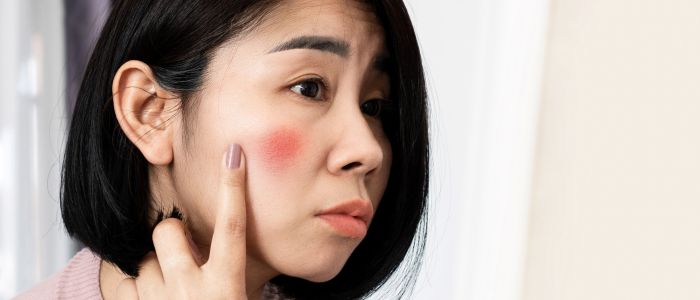
Table of Contents
- Solutions for Urticaria
- What is Urticaria?
- Types of Urticaria
- Acute Urticaria
- Chronic Urticaria
- Recognising the Symptoms
- Diagnosing the Condition
- Treatment Options
- Self-Care Strategies
- Living with Chronic Urticaria
- When to Seek Medical Help
- Myths and Misconceptions
- FAQs about Causes and Treatment for Urticaria
- Further Reading about Procedures at Cheshire Cosmetic Surgery
Solutions for Urticaria
Have you ever experienced sudden, itchy welts on your skin that seem to appear out of nowhere? If so, you may have encountered urticaria, commonly known as hives. This frustrating skin condition affects many people and can be both uncomfortable and distressing. At Cheshire Cosmetic Surgery, Dr Dalia offers treatment options for urticaria, providing you with practical solutions to manage this condition effectively.
What is Urticaria?
Urticaria, commonly known as hives, is characterised by the sudden appearance of raised, red or skin-coloured welts on the skin’s surface. These welts, medically termed wheals, can vary dramatically in size, ranging from tiny spots no larger than a pinhead to expansive patches that may cover significant portions of your body.
What makes this condition particularly intriguing is its transient nature. The welts typically appear suddenly, as if out of nowhere, and can disappear just as quickly, often within a matter of hours. However, this doesn’t necessarily mean the end of an episode. As some welts fade, new ones may form in different areas, creating a perpetual cycle that can persist for days, weeks, or even months in some cases.
The symptoms include:
- Raised welts: These can be red, pink, or skin-coloured and are often surrounded by an area of redness.
- Intense itching: The affected areas usually itch, sometimes severely, which can be incredibly uncomfortable and distressing.
- Burning or stinging sensation: Some people describe a burning or stinging feeling in addition to or instead of itching.
- Change in appearance: The welts can change shape, size, and location rapidly, sometimes within minutes.
- Angioedema: In some cases, it is accompanied by swelling of the deeper layers of skin, particularly around the eyes, lips, and hands.
Types of Urticaria
Becoming familiar with the different types is essential for proper management and treatment. The condition is broadly categorised into two main types based on its duration:
Acute Urticaria
This form lasts for less than six weeks. It’s often triggered by specific factors and tends to resolve once the trigger is identified and removed. Common triggers for include:
- Allergic reactions to foods, medications, or insect stings
- Viral infections
- Exposure to extreme temperatures
- Contact with irritants like nettles or chemicals
Acute urticaria is generally easier to manage as the cause is often identifiable, allowing for targeted treatment and prevention strategies.
Chronic Urticaria
When hives persist for more than six weeks, the condition is classified as chronic urticaria. This form can be more challenging to diagnose and treat for several reasons:
- The underlying cause is often unclear or multifactorial
- It may not be triggered by external factors but rather by internal processes in the body
- It can significantly impact quality of life due to its persistent nature
- It may be associated with other health conditions, particularly autoimmune disorders
Chronic urticaria is further divided into two subtypes:
Chronic Spontaneous Urticaria (CSU)
This is the most common form. The hives appear without any apparent external trigger.
Chronic Inducible Urticaria (CIU)
In this type, specific physical stimuli or environmental factors consistently trigger the hives. Examples include:
- Dermographism: Hives appear after firmly stroking or scratching the skin
- Cold urticaria: Triggered by exposure to cold temperatures
- Cholinergic urticaria: Brought on by increased body temperature, often during exercise
- Solar urticaria: Caused by exposure to sunlight or UV radiation
- Pressure urticaria: Develops in areas where sustained pressure is applied to the skin
At its core, the condition is an immune-mediated response. When triggered, certain cells in your skin, called mast cells, release histamine and other inflammatory chemicals. These chemicals cause the small blood vessels in the affected area to leak, leading to swelling in the skin’s upper layers, which manifests as the characteristic welts.
It’s important to note that while it can be extremely uncomfortable and sometimes alarming in appearance, it’s generally not dangerous. However, if the condition is accompanied by symptoms such as difficulty breathing, dizziness, or swelling of the throat, it could indicate a severe allergic reaction called anaphylaxis, which requires immediate medical attention.
For many people, it is a one-time occurrence or an occasional inconvenience. For others, particularly those with chronic urticaria, it can be a persistent challenge that significantly impacts daily life.
Recognising the Symptoms
While the primary symptom is the appearance of itchy welts, there are other signs you should be aware of:
- Raised, red or skin-coloured welts with clearly defined edges
- Welts that appear and fade quickly, usually within 24 hours
- Intense itching, burning, or stinging sensation
- Welts that can change shape, size, and location rapidly
- In some cases, swelling of the lips, eyelids, or throat (angioedema)
If you experience difficulty breathing or swallowing along with hives, seek immediate medical attention, as this could indicate a severe allergic reaction.
Diagnosing the Condition
When you visit a dermatologist like Dr Dalia for urticaria, the diagnostic process typically involves:
- A thorough medical history: Dr Dalia will ask about your symptoms, potential triggers, and any relevant medical conditions or medications.
- Physical examination: A close inspection of your skin and the characteristics of the hives.
- Allergy tests: Skin prick tests or blood tests may be conducted to identify potential allergens.
- Blood tests: These can help rule out underlying conditions or infections that might be causing the hives.
- Skin biopsy: In rare cases, a small sample of skin may be taken to examine under a microscope.
Treatment Options
The treatment aims to relieve symptoms and prevent new outbreaks. Here are some of the most effective treatment options:
- Antihistamines: These are the most common treatment option. Non-drowsy antihistamines like cetirizine, loratadine, or fexofenadine can provide relief from itching and reduce the appearance of hives.
- Corticosteroids: For severe cases, short courses of oral corticosteroids may be prescribed to reduce inflammation and itching.
- Omalizumab: This injectable medication can be effective for chronic urticaria that doesn’t respond to antihistamines.
- Cyclosporine: In some cases of severe chronic urticaria, this immunosuppressant medication may be recommended.
- H2 antihistamines: Medications like ranitidine or famotidine can be used in combination with regular antihistamines for enhanced effect.
- Leukotriene modifiers: Drugs like montelukast may be prescribed, especially if you have urticaria along with asthma.
- Topical treatments: Calamine lotion or anti-itch creams containing menthol or camphor can provide temporary relief from itching.
Self-Care Strategies
In addition to medical treatments, there are some self-care measures you can adopt to manage the condition effectively:
- Identify and avoid triggers: Keep a diary to track potential triggers and try to avoid them when possible.
- Cool compresses: Applying cool, damp cloths to affected areas can help soothe itching and reduce inflammation.
- Wear loose, comfortable clothing: Tight clothing can irritate the skin and exacerbate hives.
- Take lukewarm baths: Adding colloidal oatmeal or baking soda to your bath can help relieve itching.
- Manage stress: Practice stress-reduction techniques like meditation, yoga, or deep breathing exercises.
- Stay hydrated: Drinking plenty of water can help flush out potential toxins and keep your skin healthy.
- Use gentle skincare products: Opt for fragrance-free, hypoallergenic products to minimise skin irritation.
- Avoid scratching: While it’s tempting to scratch, this can worsen the hives and potentially lead to skin infections.
Living with Chronic Urticaria
For those dealing with chronic urticaria, the persistent nature of the condition can be challenging. Here are some tips to help you cope:
- Educate yourself: Learn as much as you can about your condition to feel more in control.
- Communicate with your dermatologist: Regular follow-ups with your dermatologist are essential
- Be patient: Finding the right treatment combination may take time, so try to stay positive and persistent.
When to Seek Medical Help
While many cases can be managed at home, there are situations where you should seek medical attention:
- If your hives persist for more than a few days despite over-the-counter treatments
- If you experience symptoms of anaphylaxis, such as difficulty breathing, dizziness, or swelling of the throat
- If your hives are accompanied by a fever, joint pain, or other unexplained symptoms
- If your quality of life is significantly impacted by this condition
Myths and Misconceptions
There are several common myths about urticaria that can lead to confusion and misinformation:
Myth 1: Urticaria is always caused by allergies.
Fact: While allergies can cause urticaria, many cases, especially chronic urticaria, have no identifiable allergic trigger.
Myth 2: Urticaria is contagious.
Fact: Urticaria is not contagious and cannot be spread from person to person.
Myth 3: Urticaria is just a cosmetic issue.
Fact: Urticaria can significantly impact quality of life and may be associated with underlying health conditions.
Myth 4: Urticaria always requires prescription medication.
Fact: Some cases of acute urticaria can be managed with over-the-counter antihistamines and self-care measures.
Myth 5: Once you have chronic urticaria, you’ll have it for life.
Fact: While chronic urticaria can persist for months or years, many people eventually experience remission.
FAQs about Causes and Treatment for Urticaria

Can urticaria be contagious?
No, urticaria is not contagious. It’s an individual response of your immune system and cannot be transmitted from person to person through physical contact or any other means.
Are there any dietary changes that can help manage urticaria?
While diet isn’t typically a primary treatment for urticaria, some people find relief by avoiding certain foods. A low-histamine diet, which eliminates foods high in histamine like aged cheeses, fermented foods, and certain fish, may help some individuals. However, it’s important to consult with Dr Dalia or a nutritionist before making significant dietary changes.
Can pregnancy trigger or worsen urticaria?
Pregnancy can sometimes trigger this condition or exacerbate existing symptoms in some women. This is thought to be due to hormonal changes. However, many women also experience improvement in their symptoms during pregnancy. It’s important for pregnant women to work closely with Dr Dalia to manage symptoms safely.
Is urticaria linked to any other health conditions?
Chronic urticaria has been associated with several other health conditions, including thyroid disorders, celiac disease, and certain types of cancers. While having urticaria doesn’t necessarily mean you have these conditions, your dermatologist may recommend screenings for these if your condition persists or if you have other symptoms.
Can stress management techniques help control urticaria?
Yes, stress management can be beneficial for many people with this condition. While stress doesn’t directly cause hives, it can exacerbate symptoms in some individuals. Techniques such as mindfulness meditation, deep breathing exercises, yoga, or cognitive behavioural therapy may help reduce stress and potentially improve symptoms. However, these should be used in conjunction with, not as a replacement for, medical treatments recommended by your dermatologist.
Medical References for Urticaria
- What causes hives and how to identify it: https://www.medicalnewstoday.com/articles/157260
- Chronic Spontaneous Urticaria (CSU): https://acaai.org/allergies/allergic-conditions/skin-allergy/chronic-hives/
- Chronic Inducible Urticaria: https://pubmed.ncbi.nlm.nih.gov/28763371/
- Pressure Urticaria – an overview | ScienceDirect Topics: https://www.sciencedirect.com/topics/medicine-and-dentistry/pressure-urticaria
- Cyclosporine for omalizumab-refractory chronic urticaria: https://pubmed.ncbi.nlm.nih.gov/30300294/
Further Reading about Procedures at Cheshire Cosmetic Surgery
- Read more about Birthmark Removal Surgery
- Read more about Lipoma Removal
- Read more about Scar Revision Surgery
- Read more about Lip Lesion Removal
- Read more about Dermal Fillers
- Read more about Causes and Treatment for Rosacea
- Read more about Causes and Treatment for Psoriasis
- Read more about Causes and Treatment for Nail Disorders
- Read more about Causes and Treatment for Melasma
- Read more about Causes and Treatment for Hyperhidrosis (Excessive Sweating)
- Read more about Causes and Treatment for Alopecia Areata
- Read more about Causes and Treatment for Acne








